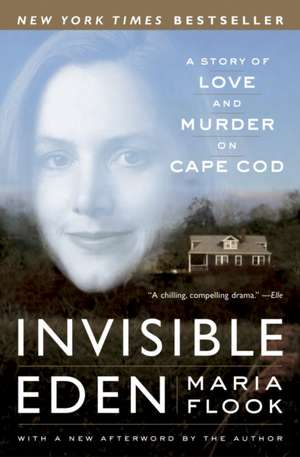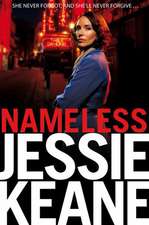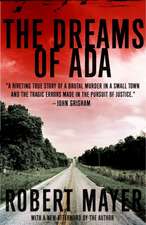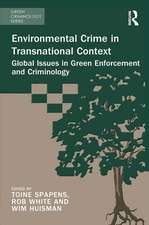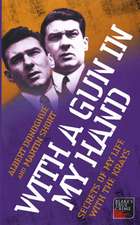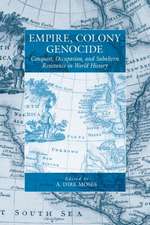Invisible Eden: A Story of Love and Murder on Cape Cod
Autor Maria Flooken Limba Engleză Paperback – 31 mai 2004
On the surface, Christa Worthington’s life had the appearance of privilege and comfort. She was the granddaughter of prominent New Yorkers. Her sparkling journalism earned the fashion world’s respect. But she had turned her back on a glamorous career and begun living in the remote Cape Cod town where she had summered as a child. When she was found murdered in Truro, Massachusetts, just after New Year’s Day in 2002, her toddler daughter clinging to her side, her violent death brought to the surface the many unspoken mysteries of her life.
Invisible Eden is the deeply felt story of a career woman's attempt to start over and reinvent her life away from the fashion circles of New York and Paris only to have an out-of-wedlock child with a local fisherman, forge a life as a single mother, and meet a violent end. Brilliantly portraying Christa’s hunger for belonging and her struggle for survival as a first-time mother, Flook searingly evokes her search for a safe haven, her many tumultuous relationships, and the evidence linking family, strangers, lovers, suspects, and innocents to the tragedy that both shocked a seaside town on Cape Cod and horrified the nation. Flook intricately maps Christa's charged life before her death and follows the first year of the murder investigation with the help of the district attorney who is in an election battle even as he searches for the killer. At the same time, Invisible Eden captures the Cape's haunted landscape, class stratifications, and never-ending battles between its weathy summer residents and its hardscrabble working families who together form a backdrop for a powerful chronicle of love and murder. An edgy and compelling portrait of a woman's tragic journey, Invisible Eden is a mesmerizing true story.
From the Hardcover edition.
Preț: 130.83 lei
Nou
Puncte Express: 196
Preț estimativ în valută:
25.04€ • 25.87$ • 20.83£
25.04€ • 25.87$ • 20.83£
Carte disponibilă
Livrare economică 27 februarie-13 martie
Preluare comenzi: 021 569.72.76
Specificații
ISBN-13: 9780767913768
ISBN-10: 0767913760
Pagini: 432
Dimensiuni: 135 x 204 x 24 mm
Greutate: 0.32 kg
Editura: BROADWAY BOOKS
ISBN-10: 0767913760
Pagini: 432
Dimensiuni: 135 x 204 x 24 mm
Greutate: 0.32 kg
Editura: BROADWAY BOOKS
Recenzii
“A chilling, compelling drama.” —Elle
Notă biografică
The recipient of an NEA fellowship and a Pushcart Prize, MARIA FLOOK is the author of My Sister Life, The Story of My Sister's Disappearance; two novels, Open Water and Family Night (which received a PEN American /Ernest Hemingway Foundation Special Citation); and a collection of short stories, You Have the Wrong Man. She teaches at Emerson College.
Extras
PARADISE ICE
Cape and Islands First Assistant District Attorney Michael O'Keefe told me to meet him Saturday night. He had agreed to discuss the recent murder of forty-six-year-old fashion writer Christa Worthington, who was found dead on the kitchen floor of her seaside cottage, her toddler daughter nestled by her side. O'Keefe said, "We'll meet. We'll talk. We'll talk about how we keep our mouths shut." He agreed to sit down, but first he was taking me to the Mashpee Wampanoag Winter Ball at the Sons of Italy Lodge in Cotuit. O'Keefe was running for office and had to show up at these community spectacles. It helped to have a woman along.
O'Keefe had known Chief Vernon "Silent Drum" Lopez and medicine man Earl Cash, Jr., for a long time, but I'd never met the Wampanoag tribe officials. I knew that in 1620, the Pilgrims had their first encounter with Native Americans in Truro, the small town where I live. A group of half-starved English separatists, led by Miles Standish, pilfered the savages' stash of corn that was buried in a sand dune. It was a rustic caper, but I guess you can say it was the first B&E, or "breaking and entering" violation, perpetrated on Cape Cod by white men. Today, the little crime scene is called Corn Hill.
O'Keefe apologized for making me drive all the way up Route 6 on Suicide Alley, a tight two-lane highway that bisects the peninsula, famous for its long chronicle of head-ons. A lot of travelers avoid the bottleneck and turn around. O'Keefe said he didn't know why anyone with free will would choose to live way out on the tip.
The Cape Cod peninsula is like a flexed arm thrust into the sea. Truro is at its "wrist," and is only a mile wide at its most narrow site. The slender hook is the afterthought of the Wisconsin Stage glacier, a monstrous wall of ice ten thousand feet thick that shaped all of New England twenty-five thousand years ago. Today, the Outer Cape is still carved and remastered by tides, storm surges, waves, and wind. The Cape is a river of sand; the shoreline continually shifts and rebuilds its ridges. Backshore lagoons arise and disappear from one year to the next. The finial arm is always roaring and tingling, eroding three to six feet a year. All aspects of life this far out are evoked and controlled, atoned for or punished, by the sea. That's what I like about it.
But the Outer Cape has a chaotic, fiddlehead topography of dunes and swales that curl around in a spiral. Standing on the breakwater at Land's End, you can lose your sense of direction entirely. What is supposed to be due west is actually looking south, and northward could be east. A person living at the inverted tip has to let go of common sense, drop the reins and rely on intuition, especially in sea mists.
"Why do you live way out there, on that clam strip?" O'Keefe said.
"You mean Truro?"
"That wilderness. Why do you people go for that?"
You people could be Truro's movers and shakers, but more likely O'Keefe is referring to the Land's End losers, lost souls and drifters who wash ashore and pile up down here.
"I guess it's not for everybody," I said. O'Keefe's sentiments mirrored those of the Reverend James Freeman, who in 1790 wrote about Truro, "What could induce any person to remain in such a place?" Even today, many people think that the Outer Cape is a "no man's land," "a god-forsaken wasteland," or "a situation so completely removed from the stir of society," as Emily Bront' writes in Wuthering Heights. Even Thoreau was appalled by the Outer Cape, and wrote of Truro, "We shuddered at the thought of living there" and "The walker there must soon eat his heart."
But for us it's Eden. It's heaven on earth. In fact, at the end of the selectmen's annual report filed in 1982, it was written, "The Board of Selectmen shall continue to make every effort to seek ways to keep Truro the Garden of Eden of Massachusetts." But I wasn't going to try to convert O'Keefe. I was getting used to his jabs.
In the summer, I like to swim in the Pamet River across from Depot Road, Christa's street. I like it when the tide turns and the water seems to percolate with indecision--its crystal surface becomes chaotic and crosshatched--is it coming or going? From my side of the tidal river, I had often seen young mothers with their kids. On sunny afternoons, a row of beach umbrellas blooms on the beach across the inlet. As the day advances, one by one these tilts are plucked and carried away. One of these gaudy pinwheels might have been Christa's.
Police have estimated that Worthington's body had not been discovered for thirty-six hours. Left unattended all that time, the little girl was found snuggled beside her mother, nursing. The police found evidence that the toddler had tried to help. A bloodied facecloth was neatly folded across the victim's forehead, and beside the body, they found the baby's weighted Tippee Cup that Ava had tried to offer to her mother.
The event of a murder in our small community was never expected. There hadn't been a murder in Truro for thirty years. Truro is renowned for its stunning wilderness, its remoteness, its quiet. In a recent issue of Men's Journal, Truro was placed near the top of the list in their survey "Fifty Best Places to Live." The article noted that one reason for its charmed status is that Truro is just about "invisible. And it means to stay that way." No such luck, when, for instance, one summer, Air Force One helicopters swooped in to deliver Vice President Al Gore and his family at a summer retreat. And Hollywood celebrates "invisible" Truro as the ideal bucolic spot in its blockbuster movies Men in Black and Men in Black II. In both these films, our small town is depicted as home and haven for Tommy Lee Jones's character, who flees violence and alien threats and returns here to become the "Truro postmaster." As absurd as that might be, before Christa's death was discovered on January 6, a murder in our town would have seemed even a further stretch.
Christa Worthington, the one-time Women's Wear Daily dynamo turned single mom, was a high-profile victim. Her killing presented instant contradictions; it crossed boundary lines within the small insular society of Truro, which had always seemed charmed and protected, like a village in a snow globe. Incongruent hitches emerged in a hodgepodge. Christa's chic CV, her Yankee credentials, and patrician lifestyle had become enmeshed with the Outer Cape's blue-collar mystique of mariner traditions, rogue sailors, lady-killers, and one local legend in particular.
Secrets, sex, and money.
The principals at the core of the murder were an offbeat triangle. There was Tony Jackett, a handsome harbormaster/shellfish constable; Tim Arnold, a quiet, sometimes stormy children's book author; and the woman who had entranced them both, Christa Worthington, a fashion writer. Praised by her editors, one of whom had called her a "fashion anthropologist," Christa left the fashion world and had holed up in Truro with her out-of-wedlock "miracle baby."
In addition to Jackett and Arnold, the murder had an unusual cornucopia of possible suspects. "Suspect is a TV word," O'Keefe griped, but the list of people "in the orbit of opportunity" was a ragtag patchwork of the American quilt.
The list included the philanderer's jilted wife, Susan, who remained "the undisputed most beautiful girl to ever graduate from Provincetown High School"; Jackett's edgy, Rapunzel-look-alike daughter, Braunwyn; the estranged husband of the edgy daughter, Keith Amato; Jackett's handsome and monastic sons, Luc and Kyle; and Christa's own father, Christopher "Toppy" Worthington, a retired Boston lawyer. Toppy's young girlfriend, Beth Porter, an ex-prostitute with a heroin habit, was also under investigation. A contrapuntal rumor soon began to circulate that Porter wasn't just a shack job but that she was Toppy's love child from an extramarital affair he had had when Christa was growing up.
That's quite a piebald gymkhana and I needed O'Keefe to help me sort through it.
O'Keefe is usually deadpan, with a wicked gleam that surfaces now and then. His stony face, dark hair, and compact physique is an attractive amalgam of two schools: the film noir detective and the all-too-familiar mainstream-TV Kojak. His locution is acerbic, clipped. He speaks in monosyllabic crits of whatever falls in front of him. Serious to a fault, his veneer is hard to break through, highly polished, and he doesn't volunteer much. But his introspections sizzle beneath the surface. It's my goal to soften him up. It's going to be tough to penetrate the steely prosecutor coupled with the savvy politician in him.
O'Keefe had told me, "I've stood over every dead body on the Cape for the last eighteen years. Unattended deaths--you have to figure out if it's suicide, accident, or murder. Like that boy killed last week in West Yarmouth--that was a violent crime. That kid lost twelve pints of his fourteen pints of blood."
"Twelve pints?"
"There's a lot of blood in you," he said.
That's almost a river. I imagined him rolling up his trouser cuffs.
"I've got a mortician's sense of humor by now," he said.
I wanted to learn how O'Keefe nosed around "murder world" without it seeping into him. It was taking its toll on me. I see Christa everywhere. If there's a woman with a little curly-topped girl in the A&P, at the ATM at Seamen's Bank, or a woman waving her Mobil speed pass, her back to me, filling her tank at the next pump. She might have Christa's high forehead, pouty lips, or sorrel hair.
Of course, it's a nobody.
The night of the Wampanoag Ball, I had volunteered to tag up with O'Keefe at the commuter lot at Exit 6 on the Mid-Cape Highway. I thought that it was a convenient spot to leave one of our cars. But he told me to go straight to his office in Barnstable. He'd meet me. He explained that his office was in the big white colonial a couple of doors east of the county courthouse, across from the Dolphin Restaurant and the demure little Barnstable post office. I took my first baby steps just up the street at 6A, and I thought I knew by heart the seventeenth-century picture-book village: the courthouse; the Barnstable Tavern; the Dolphin Restaurant; the Cancer Ransack Shop; shake-roofed cottages and Victorian guesthouses; the block-to-block antique emporiums; and, at one time, there was an aviary that sold budgies and society finches. But I had never been inside the DA's office.
I arrived after sunset to find the building was empty, blacked out. Not one light on. I left my car to walk around the footprint, in case there was an entrance on the other side and maybe O'Keefe expected me to find him. The mountain wasn't going to come to me. As I toured outside the building, I saw the Barnstable County House of Corrections perched just up the hill. Originally built to house seventy-five inmates, it now kennels three hundred. The complex was blazing; a modest little compound with an afterthought of concertina wire that twinkled in the floodlights.
As I circled the white colonial that fronted Main Street, I sidestepped a little mess on the sidewalk, a broken jar of jelly. I stared at the sugary tumble of shattered glass and strawberries. It must have jimmied from a shopping bag and exploded right here. Its blood-red pectin stained a deep scallop on the fresh-swept paving stone. Roadside stands all over Cape Cod sell these homemade jellies, watermelon pickle, and corn relish, but none of these kiosks would be in operation yet. It was early March and still the off-season. The little tub didn't have a label. I stooped and poked the weeping blob with a fingertip. I tasted it. Sweet with a sharp aftertaste.
The little treasure upset me. One time I had left a little jam pot in smithereens in a hotel room in Manhattan. Room service had brought croissants and coffee, and I pitched the mini-jar at my visitor's head as he had skulked out the door.
A car purred into the side lot and squeezed beside my Camry. I walked over to the passenger door. Instead of inviting me to sit down beside him, O'Keefe climbed out of the car. His door swung wide open to deliver a powerful blow of astringent cologne. As the car light flicked on, I saw the spray container propped on the console: "Eternity--for Men." I wondered if he brought his aftershave bottle everywhere he went.
O'Keefe was groomed and suited up in an elegant pinstripe. He was wearing the midnight-black camel hair overcoat I'd admired the first time I met him. The Wampanoag Ball was a semiformal affair. I had wanted to wear trousers because I had recently broken my ankle and it was still swollen. My vanity wounded, I sacrificed my pride and wore a little basic black number and a pair of flats. I was just out of a cast and couldn't wear heels. Embarrassed by the infirmity, I explained to O'Keefe that I felt "uneven," kicking one toe out and then the other to show him my lopsided conformation. I might as well admit the deficit and douse any expectations for perfection. He examined the damage and said, "Well, at least you're standing up."
We were just breaking the ice, but the exchange reminded me of James M. Cain's critique about a woman's "legworks" in the first pages of his noir mystery novel Serenade. Something about O'Keefe had reminded me of Cain's obsessive reverence for women even as he dismissed them, like a man who fears his addiction might be revealed if he doesn't publicly decry it.
I saw O'Keefe's hair was still damp from a hasty shower. O'Keefe didn't have an extra minute to waste. His law enforcement schedule was dawn to the wee hours, and he was always charging through his tasks full speed. From his morning coffee, he hopped from his offices with DA Phillip Rollins to the courthouse, to the state police barracks, to CPAC meetings for crime prevention and control, to taped-off chambers-of-horror murder scenes, to community soirees with teapots and trays of petits fours. He is a public man. He told me that he'd been up to the state crime lab in Sudbury, "twisting their arms and holding hands" to get them to complete DNA testing for the Worthington case. In the Sudbury lab, DNA capabilities are so limited that each of the state's district attorneys can submit only one case a month, first come, first serve. "They don't have the bodies," O'Keefe said.
"The bodies? Where do they take the bodies?"
He looked at me as if I was a "silly" and he said, "They don't have the resources. This is Massachusetts. We don't, we do not invest in the law enforcement infrastructure. We ran out of state police overtime money February ninth. Done. Gone--even in the best of times, this state doesn't spend enough dough on law enforcement. In the end, fingers are going to wag. The press are yapping, like with that Ramsey case in Colorado."
From the Hardcover edition.
Cape and Islands First Assistant District Attorney Michael O'Keefe told me to meet him Saturday night. He had agreed to discuss the recent murder of forty-six-year-old fashion writer Christa Worthington, who was found dead on the kitchen floor of her seaside cottage, her toddler daughter nestled by her side. O'Keefe said, "We'll meet. We'll talk. We'll talk about how we keep our mouths shut." He agreed to sit down, but first he was taking me to the Mashpee Wampanoag Winter Ball at the Sons of Italy Lodge in Cotuit. O'Keefe was running for office and had to show up at these community spectacles. It helped to have a woman along.
O'Keefe had known Chief Vernon "Silent Drum" Lopez and medicine man Earl Cash, Jr., for a long time, but I'd never met the Wampanoag tribe officials. I knew that in 1620, the Pilgrims had their first encounter with Native Americans in Truro, the small town where I live. A group of half-starved English separatists, led by Miles Standish, pilfered the savages' stash of corn that was buried in a sand dune. It was a rustic caper, but I guess you can say it was the first B&E, or "breaking and entering" violation, perpetrated on Cape Cod by white men. Today, the little crime scene is called Corn Hill.
O'Keefe apologized for making me drive all the way up Route 6 on Suicide Alley, a tight two-lane highway that bisects the peninsula, famous for its long chronicle of head-ons. A lot of travelers avoid the bottleneck and turn around. O'Keefe said he didn't know why anyone with free will would choose to live way out on the tip.
The Cape Cod peninsula is like a flexed arm thrust into the sea. Truro is at its "wrist," and is only a mile wide at its most narrow site. The slender hook is the afterthought of the Wisconsin Stage glacier, a monstrous wall of ice ten thousand feet thick that shaped all of New England twenty-five thousand years ago. Today, the Outer Cape is still carved and remastered by tides, storm surges, waves, and wind. The Cape is a river of sand; the shoreline continually shifts and rebuilds its ridges. Backshore lagoons arise and disappear from one year to the next. The finial arm is always roaring and tingling, eroding three to six feet a year. All aspects of life this far out are evoked and controlled, atoned for or punished, by the sea. That's what I like about it.
But the Outer Cape has a chaotic, fiddlehead topography of dunes and swales that curl around in a spiral. Standing on the breakwater at Land's End, you can lose your sense of direction entirely. What is supposed to be due west is actually looking south, and northward could be east. A person living at the inverted tip has to let go of common sense, drop the reins and rely on intuition, especially in sea mists.
"Why do you live way out there, on that clam strip?" O'Keefe said.
"You mean Truro?"
"That wilderness. Why do you people go for that?"
You people could be Truro's movers and shakers, but more likely O'Keefe is referring to the Land's End losers, lost souls and drifters who wash ashore and pile up down here.
"I guess it's not for everybody," I said. O'Keefe's sentiments mirrored those of the Reverend James Freeman, who in 1790 wrote about Truro, "What could induce any person to remain in such a place?" Even today, many people think that the Outer Cape is a "no man's land," "a god-forsaken wasteland," or "a situation so completely removed from the stir of society," as Emily Bront' writes in Wuthering Heights. Even Thoreau was appalled by the Outer Cape, and wrote of Truro, "We shuddered at the thought of living there" and "The walker there must soon eat his heart."
But for us it's Eden. It's heaven on earth. In fact, at the end of the selectmen's annual report filed in 1982, it was written, "The Board of Selectmen shall continue to make every effort to seek ways to keep Truro the Garden of Eden of Massachusetts." But I wasn't going to try to convert O'Keefe. I was getting used to his jabs.
In the summer, I like to swim in the Pamet River across from Depot Road, Christa's street. I like it when the tide turns and the water seems to percolate with indecision--its crystal surface becomes chaotic and crosshatched--is it coming or going? From my side of the tidal river, I had often seen young mothers with their kids. On sunny afternoons, a row of beach umbrellas blooms on the beach across the inlet. As the day advances, one by one these tilts are plucked and carried away. One of these gaudy pinwheels might have been Christa's.
Police have estimated that Worthington's body had not been discovered for thirty-six hours. Left unattended all that time, the little girl was found snuggled beside her mother, nursing. The police found evidence that the toddler had tried to help. A bloodied facecloth was neatly folded across the victim's forehead, and beside the body, they found the baby's weighted Tippee Cup that Ava had tried to offer to her mother.
The event of a murder in our small community was never expected. There hadn't been a murder in Truro for thirty years. Truro is renowned for its stunning wilderness, its remoteness, its quiet. In a recent issue of Men's Journal, Truro was placed near the top of the list in their survey "Fifty Best Places to Live." The article noted that one reason for its charmed status is that Truro is just about "invisible. And it means to stay that way." No such luck, when, for instance, one summer, Air Force One helicopters swooped in to deliver Vice President Al Gore and his family at a summer retreat. And Hollywood celebrates "invisible" Truro as the ideal bucolic spot in its blockbuster movies Men in Black and Men in Black II. In both these films, our small town is depicted as home and haven for Tommy Lee Jones's character, who flees violence and alien threats and returns here to become the "Truro postmaster." As absurd as that might be, before Christa's death was discovered on January 6, a murder in our town would have seemed even a further stretch.
Christa Worthington, the one-time Women's Wear Daily dynamo turned single mom, was a high-profile victim. Her killing presented instant contradictions; it crossed boundary lines within the small insular society of Truro, which had always seemed charmed and protected, like a village in a snow globe. Incongruent hitches emerged in a hodgepodge. Christa's chic CV, her Yankee credentials, and patrician lifestyle had become enmeshed with the Outer Cape's blue-collar mystique of mariner traditions, rogue sailors, lady-killers, and one local legend in particular.
Secrets, sex, and money.
The principals at the core of the murder were an offbeat triangle. There was Tony Jackett, a handsome harbormaster/shellfish constable; Tim Arnold, a quiet, sometimes stormy children's book author; and the woman who had entranced them both, Christa Worthington, a fashion writer. Praised by her editors, one of whom had called her a "fashion anthropologist," Christa left the fashion world and had holed up in Truro with her out-of-wedlock "miracle baby."
In addition to Jackett and Arnold, the murder had an unusual cornucopia of possible suspects. "Suspect is a TV word," O'Keefe griped, but the list of people "in the orbit of opportunity" was a ragtag patchwork of the American quilt.
The list included the philanderer's jilted wife, Susan, who remained "the undisputed most beautiful girl to ever graduate from Provincetown High School"; Jackett's edgy, Rapunzel-look-alike daughter, Braunwyn; the estranged husband of the edgy daughter, Keith Amato; Jackett's handsome and monastic sons, Luc and Kyle; and Christa's own father, Christopher "Toppy" Worthington, a retired Boston lawyer. Toppy's young girlfriend, Beth Porter, an ex-prostitute with a heroin habit, was also under investigation. A contrapuntal rumor soon began to circulate that Porter wasn't just a shack job but that she was Toppy's love child from an extramarital affair he had had when Christa was growing up.
That's quite a piebald gymkhana and I needed O'Keefe to help me sort through it.
O'Keefe is usually deadpan, with a wicked gleam that surfaces now and then. His stony face, dark hair, and compact physique is an attractive amalgam of two schools: the film noir detective and the all-too-familiar mainstream-TV Kojak. His locution is acerbic, clipped. He speaks in monosyllabic crits of whatever falls in front of him. Serious to a fault, his veneer is hard to break through, highly polished, and he doesn't volunteer much. But his introspections sizzle beneath the surface. It's my goal to soften him up. It's going to be tough to penetrate the steely prosecutor coupled with the savvy politician in him.
O'Keefe had told me, "I've stood over every dead body on the Cape for the last eighteen years. Unattended deaths--you have to figure out if it's suicide, accident, or murder. Like that boy killed last week in West Yarmouth--that was a violent crime. That kid lost twelve pints of his fourteen pints of blood."
"Twelve pints?"
"There's a lot of blood in you," he said.
That's almost a river. I imagined him rolling up his trouser cuffs.
"I've got a mortician's sense of humor by now," he said.
I wanted to learn how O'Keefe nosed around "murder world" without it seeping into him. It was taking its toll on me. I see Christa everywhere. If there's a woman with a little curly-topped girl in the A&P, at the ATM at Seamen's Bank, or a woman waving her Mobil speed pass, her back to me, filling her tank at the next pump. She might have Christa's high forehead, pouty lips, or sorrel hair.
Of course, it's a nobody.
The night of the Wampanoag Ball, I had volunteered to tag up with O'Keefe at the commuter lot at Exit 6 on the Mid-Cape Highway. I thought that it was a convenient spot to leave one of our cars. But he told me to go straight to his office in Barnstable. He'd meet me. He explained that his office was in the big white colonial a couple of doors east of the county courthouse, across from the Dolphin Restaurant and the demure little Barnstable post office. I took my first baby steps just up the street at 6A, and I thought I knew by heart the seventeenth-century picture-book village: the courthouse; the Barnstable Tavern; the Dolphin Restaurant; the Cancer Ransack Shop; shake-roofed cottages and Victorian guesthouses; the block-to-block antique emporiums; and, at one time, there was an aviary that sold budgies and society finches. But I had never been inside the DA's office.
I arrived after sunset to find the building was empty, blacked out. Not one light on. I left my car to walk around the footprint, in case there was an entrance on the other side and maybe O'Keefe expected me to find him. The mountain wasn't going to come to me. As I toured outside the building, I saw the Barnstable County House of Corrections perched just up the hill. Originally built to house seventy-five inmates, it now kennels three hundred. The complex was blazing; a modest little compound with an afterthought of concertina wire that twinkled in the floodlights.
As I circled the white colonial that fronted Main Street, I sidestepped a little mess on the sidewalk, a broken jar of jelly. I stared at the sugary tumble of shattered glass and strawberries. It must have jimmied from a shopping bag and exploded right here. Its blood-red pectin stained a deep scallop on the fresh-swept paving stone. Roadside stands all over Cape Cod sell these homemade jellies, watermelon pickle, and corn relish, but none of these kiosks would be in operation yet. It was early March and still the off-season. The little tub didn't have a label. I stooped and poked the weeping blob with a fingertip. I tasted it. Sweet with a sharp aftertaste.
The little treasure upset me. One time I had left a little jam pot in smithereens in a hotel room in Manhattan. Room service had brought croissants and coffee, and I pitched the mini-jar at my visitor's head as he had skulked out the door.
A car purred into the side lot and squeezed beside my Camry. I walked over to the passenger door. Instead of inviting me to sit down beside him, O'Keefe climbed out of the car. His door swung wide open to deliver a powerful blow of astringent cologne. As the car light flicked on, I saw the spray container propped on the console: "Eternity--for Men." I wondered if he brought his aftershave bottle everywhere he went.
O'Keefe was groomed and suited up in an elegant pinstripe. He was wearing the midnight-black camel hair overcoat I'd admired the first time I met him. The Wampanoag Ball was a semiformal affair. I had wanted to wear trousers because I had recently broken my ankle and it was still swollen. My vanity wounded, I sacrificed my pride and wore a little basic black number and a pair of flats. I was just out of a cast and couldn't wear heels. Embarrassed by the infirmity, I explained to O'Keefe that I felt "uneven," kicking one toe out and then the other to show him my lopsided conformation. I might as well admit the deficit and douse any expectations for perfection. He examined the damage and said, "Well, at least you're standing up."
We were just breaking the ice, but the exchange reminded me of James M. Cain's critique about a woman's "legworks" in the first pages of his noir mystery novel Serenade. Something about O'Keefe had reminded me of Cain's obsessive reverence for women even as he dismissed them, like a man who fears his addiction might be revealed if he doesn't publicly decry it.
I saw O'Keefe's hair was still damp from a hasty shower. O'Keefe didn't have an extra minute to waste. His law enforcement schedule was dawn to the wee hours, and he was always charging through his tasks full speed. From his morning coffee, he hopped from his offices with DA Phillip Rollins to the courthouse, to the state police barracks, to CPAC meetings for crime prevention and control, to taped-off chambers-of-horror murder scenes, to community soirees with teapots and trays of petits fours. He is a public man. He told me that he'd been up to the state crime lab in Sudbury, "twisting their arms and holding hands" to get them to complete DNA testing for the Worthington case. In the Sudbury lab, DNA capabilities are so limited that each of the state's district attorneys can submit only one case a month, first come, first serve. "They don't have the bodies," O'Keefe said.
"The bodies? Where do they take the bodies?"
He looked at me as if I was a "silly" and he said, "They don't have the resources. This is Massachusetts. We don't, we do not invest in the law enforcement infrastructure. We ran out of state police overtime money February ninth. Done. Gone--even in the best of times, this state doesn't spend enough dough on law enforcement. In the end, fingers are going to wag. The press are yapping, like with that Ramsey case in Colorado."
From the Hardcover edition.
Descriere
Flook launches a literary investigation into a story that riveted the nation: how an accomplished, world-traveled fashion writer who had retreated to a simpler life as a single mother on Cape Cod became the victim of a brutal, still-unsolved murder.
